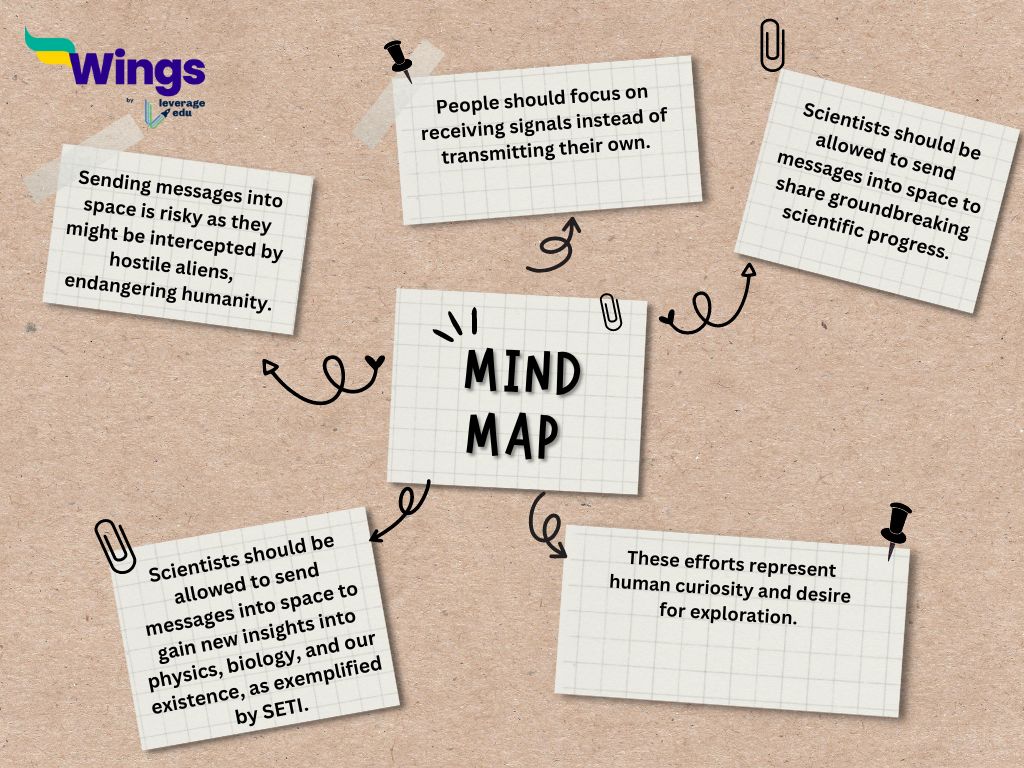Brainstorming Ideas
Refer to the following brainstorming ideas to get a solid idea of the answer.
Reasons for thinking that it is dangerous to send messages into space to communicate with other life forms:
- They might get intercepted by a hostile alien civilization which can cause harm to humanity.
- For example- Stephen Hawking stated that the meeting between Columbus and Native Americans didn’t end well for the latter.
- So, people should listen to signals rather than sending their own.
Reasons for believing that scientists should be allowed to send messages into space to communicate:
- Unprecedented scientific progress
- Could provide us with new insights into physics, biology, and even our existence. For example- SETI
- These efforts represent human curiosity and desire for exploration.

Q. Some think scientists should be allowed to send messages into space to communicate with other life forms while others believe this is too dangerous. Discuss both sides and give your own opinion.
Ans. The question of whether scientists should be permitted to transmit messages into space to communicate with extraterrestrial life is a debatable one. While some people argue that it can help in groundbreaking discoveries, others contend that it would pose significant risks. I believe that scientists should be allowed to send messages into space to communicate with other life forms.
On one hand, critics argue that sending messages in space can be dangerous. They fear that if these signals are intercepted by a hostile alien civilization, it can lead to disastrous consequences for humanity. The renowned physicist Stephen Hawking, for example, warned that making contact with advanced aliens might be as same as Native Americans encountering Columbus- a meeting that did not end well for Americans. Thus, they advocate for caution, suggesting that we should listen for signals from space rather than broadcasting our own.
On the other hand, proponents of interstellar communication argue that it could lead to unprecedented scientific progress. They believe that if there exists an intelligent life elsewhere in the universe, communicating with them could provide us with new insights into physics, biology, and even our existence. For instance, the Search for Extraterrestrial Intelligence (SETI) project has been sending radio signals into space for decades, hoping that it would make contact with alien civilizations. These efforts represent human curiosity and desire for exploration, which is a driving force behind many greatest scientific achievements.
In conclusion, while both sides have valid arguments, I believe that the potential benefits of interstellar communication outweigh the potential risks if such efforts are taken responsibly. Establishing contact with extraterrestrial life could have profound implications, allowing humans to reevaluate our place in the universe. However, any attempt to communicate with alien civilizations should be undertaken with extreme caution and under international consensus to mitigate potential risks.
Analysis
Paraphrased Statement: The question of whether scientists should be permitted to transmit messages into space to communicate with extraterrestrial life is a debatable one. While some people argue that it can help in groundbreaking discoveries, others contend that it would pose significant risks.
Thesis Statement: I believe that scientists should be allowed to send messages into space to communicate with other life forms.
Body Paragraph 1-Topic Sentences: On one hand, critics argue that sending messages in space can be dangerous. They fear that if these signals are intercepted by a hostile alien civilization, it can lead to disastrous consequences for humanity.
Body Paragraph 1- Supporting Reasons and Explanations: The renowned physicist Stephen Hawking, for example, warned that making contact with advanced aliens might be as same as Native Americans encountering Columbus- a meeting that did not end well for Americans. Thus, they advocate for caution, suggesting that we should listen for signals from space rather than broadcasting our own.
Body Paragraph 2- Topic sentence: On the other hand, proponents of interstellar communication argue that it could lead to unprecedented scientific progress. They believe that if there exists an intelligent life elsewhere in the universe, communicating with them could provide us with new insights into physics, biology, and even our existence.
Body paragraph 2- Supporting Reasons and Explanations: For instance, the Search for Extraterrestrial Intelligence (SETI) project has been sending radio signals into space for decades, hoping that it would make contact with alien civilizations. These efforts represent human curiosity and desire for exploration, which is a driving force behind many greatest scientific achievements.
Conclusion: In conclusion, while both sides have valid arguments, I believe that the potential benefits of interstellar communication outweigh the potential risks if such efforts are taken responsibly. Establishing contact with extraterrestrial life could have profound implications, allowing humans to reevaluate our place in the universe. However, any attempt to communicate with alien civilizations should be undertaken with extreme caution and under international consensus to mitigate potential risks.
Vocabulary in Use
| Word | Meanings |
| Transmit | To send or forward to a destination. |
| Intercepted | To stop and catch something before it reaches its destination. |
| Hostile | Showing strong dislike or unfriendliness. |
| Proponents | A person who supports a particular idea or plan. |
| Unprecedented | Never happened or existed in the past. |
| Profound Implications | Intense, significant conclusions or effects inferred from a situation or information. |
| Consensus | A generally accepted opinion among a group of people. |
| Mitigate | To make something less severe or painful. |
| Outweigh | To exceed in weight, value, or importance. |
| Quest | A long search for something difficult to find. |
| Relentless Pursuit | Continuous and determined action of chasing or striving for something. |
Linkers and Connectors Used
Following are the linkers and connectors used:
- While
- On one hand
- For Example
- Thus
- On the other hand
- For instance
- In my opinion
- However
- In conclusion
Are you preparing for IELTS? Check out this video to improve your writing skills for the IELTS exam given below👇.
Download the Leverage IELTS App today.


Need help preparing for IELTS? Check out the best IELTS preparation courses in the market offered in a live training environment by trusted educators. If you want to help studying abroad, call 1800572130.


 One app for all your study abroad needs
One app for all your study abroad needs












 60,000+ students trusted us with their dreams. Take the first step today!
60,000+ students trusted us with their dreams. Take the first step today!